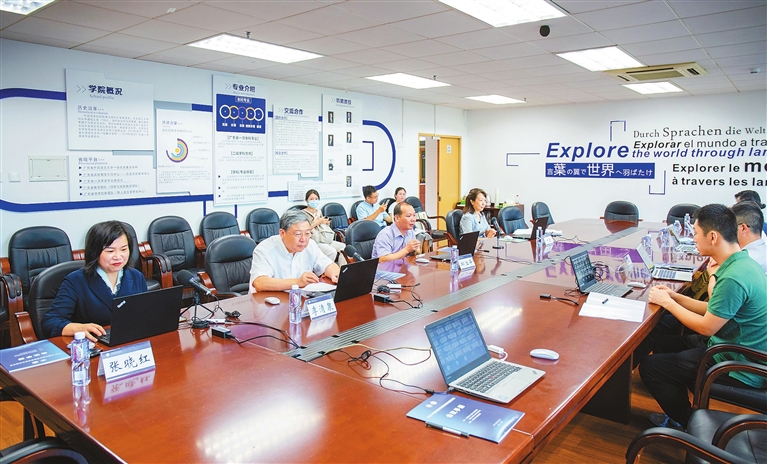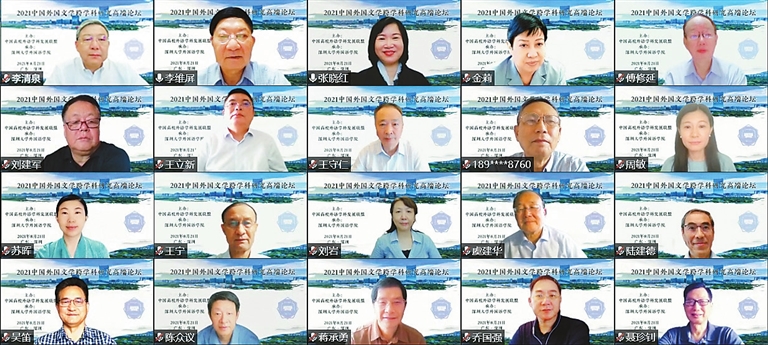

Mercy Ye muxiye.mercy@gmail.com LAST Saturday marked a significant day for the School of Foreign Languages (SFL) of Shenzhen University (SZU). The 2021 China Foreign Literature Interdisciplinary Research Forum was held jointly by SZU and Interdisciplinary Research Committee on Foreign Literature (IRCFL). This forum, themed “Modernization — Urbanization — Mobility: The Formation of Community and Interdisciplinary Research in Foreign Literatures,” was driven by the two initiatives: Double First-Class, which aims to ultimately build a number of world- class universities and disciplines by the end of 2050 in China, and New Liberal Arts, which aims to cultivate interdisciplinary social scientists who are well-versed in Chinese language and culture and ready to become China’s global advocate. Nineteen prominent Chinese scholars and researchers in the field of foreign literature, from 14 prestigious universities across the country, joined through Tencent Conference on Saturday, and viewers from all around the world attended virtually via bilibili.com’s live broadcast. Professor Zhang Xiaohong, the dean of SFL, presided over the opening ceremony. Professor Li Qingquan, secretary of the Party committee and president of SZU, delivered a welcome speech, congratulating Shenzhen and SZU for the fruits they bore in the past 40 years, and SFL for the strides they made in academia. Despite the gravity of the forum, viewers of the live broadcast constantly “burst out laughters” through Bilibili’s danmu (bullet screen). Professor Fu Xiuyan from Jiangxi Normal University gave a speech on the construction of meaning through the endowment, circulation, and distribution of objects, drawing from French sociologist and cultural theorist Jean Baudrillard’s theory. When Fu used the well-known protagonist Jia Baoyu in the Chinese classic literature “A Dream of Red Mansions” and his precious jade — said to be a stone left by the goddess Nyu Wa after repairing the Wall of Heaven — as an example, he cracked up the audience by saying Jia’s act of disowning his stone could be the very first “fanersai ti” (humblebrag). “Very few people would be upset about owning an object,” Fu added. “Baoyu did not want the symbol of riches and honor.” The duet of “person-object” was made into a trio of “person-object-place” by professor Liu Yan from Shenzhen University. Her interdisciplinary research on geographical perception and value identification helped clarifying the relationship between people and places, and groups and regions, thus providing a great insight to “the building of a community with a shared future for mankind.” During Liu’s speech, the live broadcast on bilibili.com reached a peak with over 19,000 viewers. A highlight of the speech is French anthropologist Marc Augé’s concept of “non-place” — places such as shopping malls and airport terminals are not inclined to give rise to emotional identity, due to a mobility of high speed and high frequency. People rarely pause, in a “non-place.” The morning session ended with a speech by professor Wang Lixin from Nankai University, which concentrated on the theme of “community” by providing an in-depth analysis of the coexistence of essentialism and constructivism in the narrative of the community of the Hebrew nation. Wang gave an innovative elucidation of Indian scholar, literary theorist, and feminist critic Gayatri Chakravorty Spivak’s theoretical views, pointing out that it is the interaction of “the word,” “the world,” and “the spirit” that begot the full-of-tension Hebrew narratives. Though finding it obscure, netizens showed great respect and interest to the subject, and asked for recording of the speech and references for attempts to tackle this subject. The second half of the forum started on time at 2 p.m., and the viewers’ interest did not seem to diminish even slightly after the afternoon lull. The refreshing suggestion on cross-culture study by professor Liu Jianjun from Shanghai Jiaotong University was highly praised by the netizens, many felt “being anointed” while listening to his speech. Liu’s suggestion consists of two parts: “returning to the text,” so the cognitive style of the subject — may it be a country or a nation — could be comprehended, and “getting out of the text,” so practical problems can be heeded. Liu concluded that to study cross-culture is to be freed from the yoke of “cross-cultural comparison,” returning to the text to ruminate on the difference between subjects, including but not limited to, nationalities, eras, disciplines, and people. Another speech that sparked great interest among the viewers was by professor Wu Di from Zhejiang University. Wu’s topic “Disease Depiction and Medical Science Ambition in Chekhov’s Novels” focused on Russian playwright and master of the modern short story Anton Chekhov’s interdisciplinary study of medical science and literature. Wu pointed out that both literature and medical science are of healing, one for the soul, and the other for the body. In fact, many writers studied medical science. Two examples brought up by Wu were Lu Xun from China, and Williams Carlos Williams from the United States. Chekhov referred to the medical science and literature fondly as “two rabbits that he had been chasing after,” and explained further with the analogy that “medical science his married wife, and literature his concubine.” One netizen named “ALiZhiShiShuiA” was impressed by the connection between medical science and literature, an anonymous netizen stated that “epidemic literature has been very popular in recent years,” while another commented that “Chekhov himself was in need of healing for such an analogy.” Other professors from Chinese Academy of Social Sciences, Beijing Foreign Studies University, Shanghai Foreign Studies University, Zhejiang Gongshang University, Nanjing University, Xiamen University, Hangzhou Normal University, Central China Normal University, and East China Normal University also provided great insight to the topic. The popular opinion among the viewers is that each professor should spend a day or more on each topic — they did not hear enough. Much gratitude was expressed on the bullet screen, thanking SZU and SFL for hosting such a feast of academics. According to the representative of the organizer, professor Zhang Xiaohong, SFL of SZU has not only held many high-level and high-standard international and domestic academic conferences like the one on Saturday, but also founded the international journal Language, Context and Text: The Social Semiotics Forum, and the A& HCI Journal Neohelicon. The school has made continuous efforts and long-term contributions to promote the internationalization of Chinese humanities and social sciences. | 
